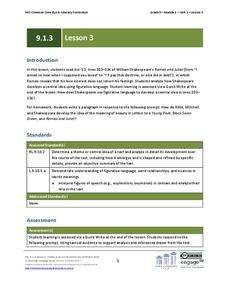Achieve3000
Figurative Language
Similes and metaphors make writing more beautiful and detailed, but can be a little harder to decipher during a first reading. Use a passage from The Man Who Loved Words to show young readers how to think through passages that...
EngageNY
Grade 11 ELA Module 2: Unit 1, Lesson 22
Say precisely what you mean. Scholars analyze the importance of Washington's precise language in paragraphs eight and nine of the "Atlanta Compromise" speech. They interpret his figurative language and add it to their Idea Tracking...
Cleveland Metro School District
Novel Lesson for The Giver
Lois Lowry's The Giver is one of the most engaging and thought-provoking works of literature in the middle school curriculum. Round out your novel unit with a collection of reading activities, comprehension questions, memoir and...
EngageNY
Grade 10 ELA Module 4: Unit 2, Lesson 5
When Macbeth says, "Nature seems dead," he uses personification. Using the resource, scholars complete a Quick Write to analyze the impact of figurative language on the mood of Shakespeare's Macbeth. Pupils also participate in an...
EngageNY
Grade 10 ELA Module 4: Unit 2, Lesson 13
Lady Macduff uses a metaphor to suggest that her husband does not possess the courage of even a tiny, short-winged bird—ouch! Using the resource, pupils discover Act 4.2 of Shakespeare's Macbeth. Using reading, writing, and discussion,...
EngageNY
Grade 11 ELA Module 1: Unit 2, Lesson 8
How does Shakespeare employ figurative language to emphasize central ideas in Hamlet? Using an interesting resource, learners complete a Quick Write to answer the question. Additionally, they continue their study of the play by exploring...
Florida Center for Reading Research
Vocabulary: Words in Context, Ask-Explain-List
Engage young readers in using context clues with this collaborative vocabulary activity. In pairs, children draw from a deck of cards, with each card asking a question about a context involving a specific vocabulary word. After...
EngageNY
Grade 10 ELA Module 2: Unit 1, Lesson 14
Let's see how the story unfolds. Scholars examine paragraphs of Martin Luther King Jr.'s "Letter from Birmingham Jail" to determine how King unfolds his analysis of the church. Before arriving at an answer, learners work in pairs and...
EngageNY
Grade 11 ELA Module 2: Unit 1, Lesson 10
What are you implying? Scholars look at paragraphs eight and nine of the chapter "Of Our Spiritual Strivings" to determine the implications of Du Bois's use of metaphors. In groups, readers discuss the use of metaphors and add their...
Curated OER
My Antonia: Magic Squares (Vocabulary Strategy)
Help your pupils discover the power of context clues by teaching the this vocabulary strategy. Designed to go with words from Willa Cather's My Antonia, this exercise focuses on having individuals use their own words to define new...
Florida Center for Reading Research
Vocabulary: Words in Context, Pun Fun
Scholars explore a variety of texts to locate wordplay. Partners read their selections and discuss meanings.
Pearson
Catching the Sun: Tales from Asia
Explore the folklore of Asia and the South Pacific with this language arts lesson series. Complementing a reading of Catching the Sun: Tales from Asia by Jan M. Mike, this resource supports learners with understanding cause and...
Curated OER
Understanding and Using Suffixes to Expand Vocabulary
After a review of what suffixes are and how they are used, middle schoolers utilize a worksheet that is embedded in the plan to work in pairs to strengthen their understanding and skills in using these very important parts of our...
EngageNY
Grade 9 ELA Module 1: Unit 3, Lesson 3
Class members listen to a masterful reading of Act 1, Scene 1, lines 203-236 of Romeo and Juliet and then break into groups to examine how Shakespeare uses figurative language to develop Romeo's idealized concept of beauty.
EngageNY
Grade 9 ELA Module 1: Unit 3, Lesson 5
Class members continue their study of Romeo and Juliet by watching scenes from Baz Luhrmann’s Romeo + Juliet and then examining the figurative language Shakespeare uses in Act 1, scene 5, lines 92–109 when Romeo and Juliet meet at the ball.
National Endowment for the Humanities
Language Analysis Based on Stave 1
Class members meet the original scrooge, the Dickens character whose name has become synonymous with a cold-hearted, tight-fisted, miser. Using the provided worksheet, readers closely examine context clues to determine the meanings of...
EngageNY
Grade 9 ELA Module 1, Unit 1, Lesson 6
Can you tell everything about a character based on their actions? Delve into the prominent characters of Karen Russell's "St. Lucy's Home for Girls Raised by Wolves" with helpful reading tips and discussion questions. A thorough lesson...
Houghton Mifflin Harcourt
Problem Solvers: Extra Support Lessons (Theme 4)
When it comes to reading and understanding a text, sometimes readers need extra help. The third and final resource in a series of guides to accompany Theme 4: Problem Solvers provides additional activities to help struggling learners....
Twisty Noodle
Animal Action Cards Book
Can you stomp like a elephant? Or slither like a snake? Use these animal cards to get your little monkeys moving! Each card features an illustration and action word that matches the animal.
Curated OER
Visualization: Cricket in Times Square
After reading The Cricket in Times Square chapter titled "Caught in the Kitchen," learners list three describing details about the characters and setting. Groups collaborate to find sensory details to support their character assertions....
Curated OER
Gary Paulsen's Canyons: Vocabulary Activity
The final chapters of Canyons (chapters 17-24) present readers with more challenging vocabulary. Two activities provide readers with an opportunity to figure out what they know, and then to use what they know to complete a word search...
EngageNY
Grade 11 ELA Module 1: Unit 2, Lesson 11
What is Hamlet's attitude towards life and death in Shakespeare's Hamlet? Scholars continue reading the play to answer the question, paying particular attention to Hamlet's most famous soliloquy. By holding a discussion and completing...
EngageNY
Grade 11 ELA Module 2: Unit 2, Lesson 6
How did the women's rights movement create a ripple effect, improving the lives of future generations? Scholars read and analyze paragraphs 11-12 of "An Address by Elizabeth Cady Stanton," in which the author emphasizes the importance of...
EngageNY
Inferring About Character: Atticus (Chapter 5)
As part of their study of Harper Lee's To Kill a Mockingbird, class members participate in a silent discussion of the novel using a Chalk Talk chart. They then respond to the teacher's questions by writing their thoughts on the chart....























